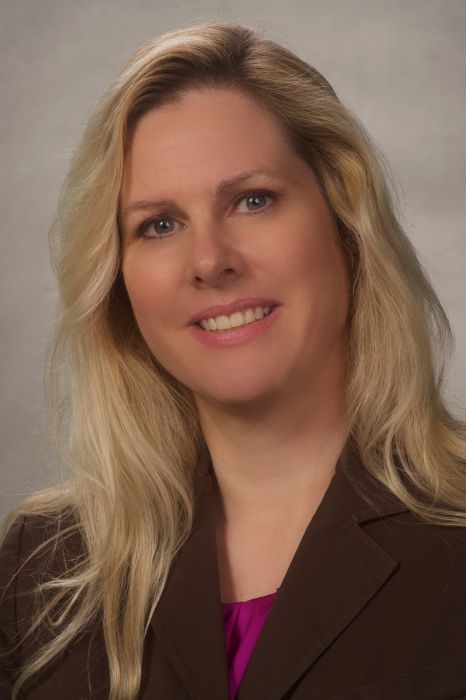
Terri Ares, lecturer and Clinical Nurse Specialist (CNS) program adviser at California State University, Dominguez Hills (CSUDH), means a lot to her students.
Entrenched last fall while finishing their clinical hours, studying for final exams and preparing for graduation, her students somehow etched out enough time to gather feedback about Ares from multiple sources, solicit letters from her colleagues, and assemble an award nomination package to submit to the National Association of Clinical Nurse Specialists (NACNS).
Their efforts paid off. On March 6, Ares was presented the NACNS’ prestigious Clinical Nurse Specialist Educator of the Year Award during its 2015 Annual Conference in San Diego. The national award recognizes outstanding professional achievement among CNS educators, and acknowledges excellence and innovation in preparing CNS students.
“I was very excited when I heard I won the award, primarily because it was the students who had put forward the nomination. It’s wonderful they did that during their busy final semester here,” said Ares, a Hemet resident who earned her bachelor’s and master’s degrees in nursing at CSUDH (Class of 1998, BSN; 2005, MSN, clinical nurse specialist). “This is probably a once-in-a-life-time thing. When you’re really just focusing hard on teaching–we all do a lot of teaching here–it doesn’t necessarily mean you’re going to be recognized nationally. So this is a truly a humbling experience.”
CNS students Darlene Rabe-Kerr, Sandra Alviso, Ruby Loyola, Sarah Scoins and Zhuiming Zhang, also penned a group note for their award nomination package.
“Since we began attending the CNS program here at CSUDH, Dr. Ares has been a great role model for all of us. Not only is she a teacher and coach, but she cares, encourages and supports us every step of the way,” wrote the students. “Dr. Ares has always been there, sacrificing time on weekends and in the evening, talking to us over the phone, and giving us invaluable advice. She is the light that guides us through that feeling of falling into a dark hole.”
The CNS program at CSUDH is taught almost entirely online. Its required in-house clinical hours are available at sites throughout California.
Ares enjoys the online format, and teaching both seasoned nurses who enroll at CSUDH to earn a higher degree and newcomers to the field.
“It takes some skill to teach a person who is brand new, and still be able to engage people who have been practicing for decades,” she said. “It’s also rewarding to be able to bring together your own personal and practical experiences and education to teach at each level.”
The School of Nursing at CSUDH and its degree programs were recently ranked nationally by US News and World Reports and Nursejournal.org.
 Ares was also acknowledged by the association for her dedication to improving the CNS program at CSUDH. The program offers a Bachelor in Science Nursing (BSN) and a Masters in Science Nursing (MSN) in two CNS options, parent-child and gerontology. However, when Ares joined the faculty in 2007, declining enrollment threatened the future of the gerontology option.
Ares was also acknowledged by the association for her dedication to improving the CNS program at CSUDH. The program offers a Bachelor in Science Nursing (BSN) and a Masters in Science Nursing (MSN) in two CNS options, parent-child and gerontology. However, when Ares joined the faculty in 2007, declining enrollment threatened the future of the gerontology option.
Ares proposed and offered to teach both curriculums. But rather than teaching them as two separate courses, she took a more holistic approach that ultimately strengthened both options.
“In my mind the courses didn’t need to be segregated because the nursing roles in both options featured many of the same elements, and enrollment was not high enough to justify having separate courses,” said Ares. “Instead of having two similar curricula with small courses in each program, or just parent-child with no gerontology at all, we mixed them together.
“Now only the specialty courses are separate. It made things more viable and allowed us to build the gerontology group back up. Now the students interact, which is great because each field has unique specialties that complement each other.”
Along with outstanding achievement, the NACNS noted Ares’ inventive program development skills and her leadership style as major factors in choosing her to receive the educator of the year honor.
“Dr. Ares has made significant improvements to CNS education at Cal State Dominguez Hills and has been recognized by faculty and students alike for her success in instituting new programming,” said NACNS 2015 President Peggy Barksdale. “We are proud to honor her as the CNS Educator of the Year in recognition of her exemplary efforts to ensure that her students receive the highest quality CNS education.”
Her focus on “role clarification” and how she encourages students to “think like a CNS and appreciate the possibilities within the role” also caught the association’s attention.
“Ares’ research of the socialization of graduate students to the CNS role provides new insight into this aspect of CNS education in the U.S.,” the NACNS released in a statement.
The association was also impressed with her contribution to the development of the Electronic Poster Presentation requirement to help her CNS students hone their presentation skills.
“We infused posters into the program because many of our CNS students have not done a professional poster,” said Ares. “Now they can go to conferences and present their work. All they have to do is take their USB drives to a printer and have their posters made, which is good because professional conferences can be a little intimidating for all students.”
Carole A. Shea, a professor emerita at CSUDH, contributed a letter to CNS students’ nomination package.
“I hired the candidate [Ares] for a faculty position in 2007 when I was the former director of the School of Nursing,” wrote Shea. “She possessed excellent communication skills and exhibited a very impressive dedication to teaching, scholarship and professional practice. She has set a high bar for excellence in teaching at both the BSN and MSN levels.”
After completing her master’s degree at CSUDH, Ares went on to earn her Ph.D. in nursing education at Villanova University, where she received the College of Nursing’s “Best Dissertation Award.”
As a CSUDH alumna, Ares is proud of the CNS program and how it has “evolved” over the years.
“Our CNS program has always been unusual in that serves students who are already nurses but can’t be on campus three days a week in a traditional class,” she said. “That is just one of the things I love about it. As an online program, I love that I have students up and down the state. I love that some of my students are on the east coast. I Love the flexibility and challenges of our program, which is offered to special kinds of students–those who appreciate a limited number of barriers while pursuing their academic goals.”